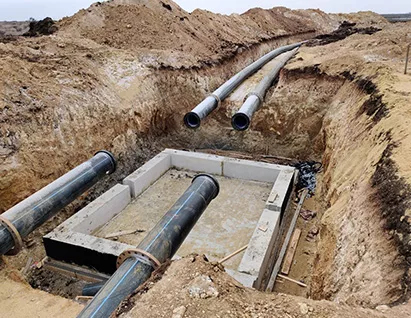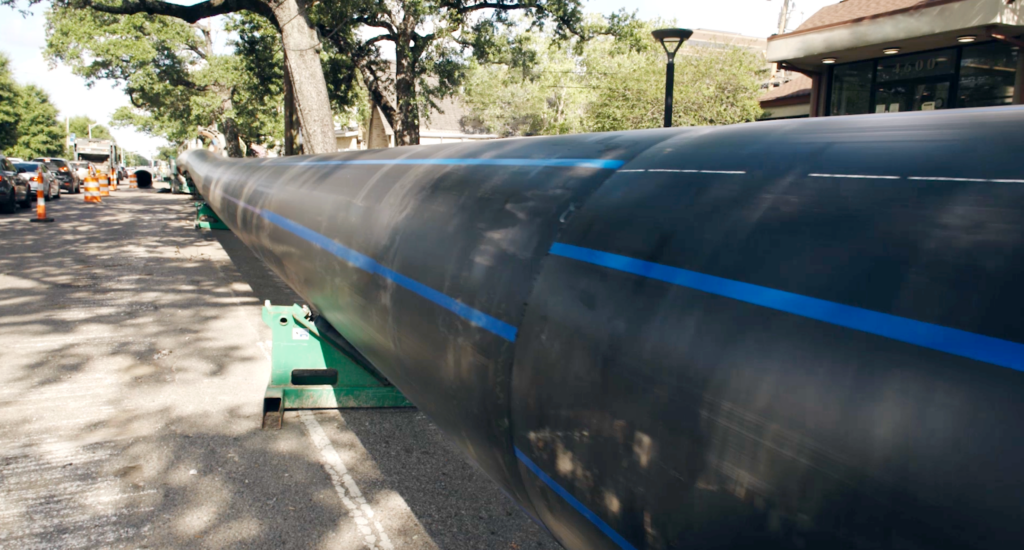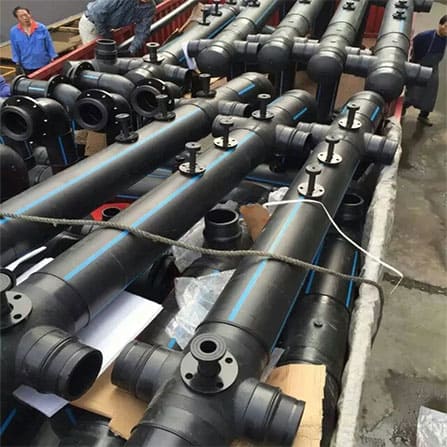Exploring the Leading Pipeline Manufacturers: Top Quality, Integrity, and Advancement
The pipeline manufacturing industry stands at the junction of top quality, advancement, and reliability, driven by leading companies such as Tenaris and Vallourec. These producers are not only dedicated to creating high-performance products yet are likewise introducing sustainable methods that resolve modern ecological concerns (Pipeline Manufacturer). As we check out the criteria that define excellence in pipeline services, it ends up being apparent that the landscape is rapidly evolving. What specific technologies are arising, and just how are these innovations shaping the future of pipeline framework? The answers might redefine market requirements in means that are not yet completely comprehended
Leading Manufacturers Overview
In the domain name of pipeline manufacturing, numerous vital gamers become leaders, each contributing considerably to the market's landscape. Business such as Tenaris, Vallourec, and JFE Steel have established themselves as frontrunners by regularly providing top notch products that satisfy rigid market requirements. Tenaris, renowned for its ingenious options, focuses on smooth and bonded pipes, catering mainly to the oil and gas industry. Vallourec, a French international, concentrates on the manufacturing of premium tubular services, emphasizing sustainability and advanced innovation in its manufacturing procedures.
Likewise, JFE Steel, a major Japanese manufacturer, is identified for its extensive series of steel pipelines, especially those made use of in energy and facilities jobs. Their commitment to r & d has actually enabled them to produce high-performance materials that stand up to harsh ecological problems. In addition, business like U.S. Steel and National Oilwell Varco have increased their market visibility by expanding their item offerings and improving operational effectiveness.
These leading producers not only control the marketplace but additionally drive development within the sector, setting standards for high quality and reliability that gamers aspire to accomplish. Their contributions are crucial for fulfilling the increasing demand for efficient and sturdy pipeline services worldwide.
Requirements for High Quality Evaluation
Quality analysis in pipeline manufacturing rests on 2 critical requirements: product sturdiness standards and manufacturing process effectiveness. Ensuring that materials meet extensive durability benchmarks is vital for the long life and integrity of pipelines. Furthermore, enhancing the manufacturing procedure can boost performance while keeping premium quality, inevitably influencing total efficiency and safety.
Material Toughness Standards
Guaranteeing the longevity and reliability of pipeline materials is vital for keeping framework honesty and functional effectiveness. Material sturdiness standards play an important role in reviewing the high quality of pipelines, determining the efficiency and lifespan of the products used in building and construction. Manufacturers should abide by a variety of rigorous standards, consisting of those established by organizations such as ASTM International and the American Petroleum Institute (API)
These standards assess various variables, consisting of rust resistance, tensile strength, and exhaustion efficiency. For example, pipelines made use of in harsh environments require materials that can hold up against chemical deterioration, while those subjected to high-pressure problems need to display remarkable tensile strength.
Furthermore, factors such as temperature level fluctuations and ecological conditions need to be thought about, as these can greatly influence product behavior with time. Manufacturers frequently make use of sophisticated screening approaches, consisting of accelerated aging examinations, to replicate lasting wear and assurance that products meet or exceed industry benchmarks.
Manufacturing Process Performance
Manufacturers' ability to enhance making process effectiveness is essential for producing premium pipelines that fulfill rigorous sector criteria. Performance in producing directly influences price monitoring, production timelines, and general item honesty. To achieve this, leading pipeline producers carry out advanced methods such as lean manufacturing, automation, and real-time information analytics.
Lean making concepts are important in minimizing waste and maximizing resource usage. By enhancing procedures and removing redundancies, producers can boost performance while making certain constant high quality. Automation innovations, including robotics and computer numerical control (CNC) devices, play a critical function in improving accuracy and minimizing human error, thereby boosting the reliability of the last item.
Furthermore, the usage of real-time information analytics allows suppliers to keep track of manufacturing processes constantly, enabling them to identify bottlenecks and make prompt changes. This positive technique not only enhances efficiency yet additionally supports quality control protocols by ensuring conformity with regulative standards.
Reliability in Pipeline Solutions
Reliability in pipeline remedies is extremely important, as it straight impacts the safety and security and effectiveness of fluid transportation systems. Trick aspects consist of the sturdiness of materials used, adherence to rigorous screening and certification criteria, and the unification of innovative material options that boost performance. Understanding these elements is essential for manufacturers intending to deliver trustworthy pipeline infrastructure.
Value of Resilience
Achieving longevity in pipeline services is essential, as it directly influences the long-term performance and safety of facilities. Sturdy pipelines are crucial for reducing upkeep expenses and lowering the possibility of tragic failures. This dependability is specifically essential in industries such as oil and gas, supply of water, and wastewater monitoring, where the consequences of pipeline failing can be extreme, both financially and environmentally.
The materials and making procedures utilized by pipeline makers play a significant function in establishing the resilience of the last item. Making use of premium resources, advanced innovations, and ingenious layout concepts ensures that pipes can withstand various stressors, including pressure changes, temperature variations, and destructive atmospheres.
The sturdiness of pipes is carefully connected to their ability to resist outside variables such as dirt movement, seismic task, and chemical exposures. Efficient corrosion protection approaches, such as coverings and cathodic protection, even more enhance the longevity of pipes, securing them versus degeneration gradually.
Investing in resilient pipeline solutions ultimately translates to raised functional effectiveness, reduced downtime, and boosted safety, affirming the critical relevance of longevity in modern-day pipeline manufacturing.
Testing and Qualification Requirements
In the domain name of pipeline services, strenuous testing and certification criteria are crucial to ensure the dependability and security of infrastructure. These requirements function as standards for reviewing the efficiency and sturdiness of pipeline products and systems, validating they fulfill details regulatory and industry needs.
Evaluating procedures usually incorporate different methodologies, consisting of pressure screening, hydrostatic evaluations, and non-destructive testing strategies. These evaluations are vital for recognizing prospective weak points or defects in the materials prior to they are released in real-world applications. In addition, certification by acknowledged organizations guarantees that producers comply with established standards, which cultivates trust amongst stakeholders, including engineers, service providers, and end-users.
Numerous prominent pipeline makers participate in continual monitoring and improvement of their testing procedures to adjust to progressing sector criteria and technical advancements. Compliance with standards such as ASTM, ASME, and ISO not only enhances product reliability however additionally minimizes the risk of environmental incidents connected with pipeline failures.
Ingenious Material Solutions
The advancement of ingenious product options has actually changed the landscape of pipeline manufacturing, boosting both efficiency and longevity. Advanced products such as high-density polyethylene (HDPE), cross-linked polyethylene (PEX), and composite products have become game-changers, offering exceptional resistance to deterioration, temperature changes, and stress variants. These materials not just prolong the life-span of pipelines yet additionally reduce upkeep costs, ensuring trustworthy long-term performance.
Moreover, makers are progressively adopting smart products that integrate sensing units for real-time surveillance. This technology enables proactive maintenance, substantially improving dependability by identifying leaks or structural weaknesses before they escalate right into critical failures. The integration of nanotechnology has also led to the advancement of coverings that improve the toughness of pipes versus abrasion and chemical direct exposure.
Sustainability is an additional vital emphasis, with makers exploring bio-based composites and recyclable materials that lessen environmental effect. As governing requirements remain to evolve, the focus on cutting-edge material options becomes vital in meeting rigid safety and environmental needs. Ultimately, these improvements not just boost the reliability of pipeline systems however additionally add to the general performance and sustainability of power transport infrastructures.
Advancements in Pipeline Modern Technology
Innovations in pipeline innovation are reinventing the market by improving effectiveness, security, and environmental sustainability. Recent advancements concentrate on smart pipeline systems that utilize sensing units and IoT innovation to keep track of problems in genuine time, enabling aggressive maintenance and decreasing the danger of failures. These systems can find leakages, stress changes, and other anomalies, enabling for fast reaction and lessening ecological influence.
In addition, the growth of innovative products, such as composite and corrosion-resistant alloys, considerably prolongs the life-span and reliability of pipes. HDPE Pipe Supplier (Permian Basin HDPE Pipe Supplier). These materials lower upkeep prices and improve performance in harsh environments, making them excellent for oil, water, and gas transport
Automation and robotics are playing an important function in pipeline building and assessment. Drones and robotic gadgets help with studies and analyses of hard-to-reach locations, making certain thorough examinations without endangering safety and security.
Ingenious designs, such as modular pipeline systems, permit for higher adaptability in installment and alteration, catering to the vibrant needs of the energy market. With each other, these technological innovations not only boost operational performance however additionally add to a much more durable and sustainable pipeline facilities, leading the way for a greener future.
Study of Success
Throughout various industries, successful executions of advanced pipeline modern technologies demonstrate substantial enhancements in operational performance and security. One notable instance is the implementation of clever pipeline surveillance systems in the oil and gas industry, where real-time data Visit Website analytics have actually reduced leakage detection times by over 50%. This not just minimizes environmental dangers but also improves the general honesty of pipeline framework.

Additionally, a major manufacturer implemented robotic inspection technologies in its pipeline maintenance procedures, causing a 40% renovation in examination efficiency. This approach has structured upkeep timetables and significantly decreased downtime.
These case researches highlight exactly how top pipeline makers are leveraging innovative innovations to cultivate dependability and operational quality, inevitably establishing new requirements for the industry. As these successes remain to unravel, they pave the means for further innovations in pipeline manufacturing and administration.

Ecological Sustainability Practices
Often, pipeline manufacturers are focusing on ecological sustainability methods to reduce their eco-friendly footprint and improve the longevity of their products. This dedication is reflected in various campaigns targeted at minimizing waste, preserving power, and making use of lasting products throughout the manufacturing process.

Many producers are embracing sophisticated innovations that lessen discharges and energy consumption. The combination of automated systems and energy-efficient machinery assists improve production while lowering dependence on fossil fuels. Additionally, companies are increasingly turning to environmentally friendly materials, such as recycled metals and bioplastics, which not only reduce the environmental influence yet additionally promote a round economic climate.
Pipeline suppliers are carrying out strenuous lifecycle analyses to examine the environmental implications of their items from creation to disposal. This technique allows them to determine opportunities for renovation and foster accountable sourcing and waste monitoring methods.
Cooperation with environmental companies even more boosts these efforts, as suppliers look for to straighten their operations with international sustainability objectives. Ultimately, these environmental sustainability techniques not only add to a healthier earth however also placement producers as liable leaders in the industry, attracting ecologically aware stakeholders and clients alike.
Future Trends in Pipeline Manufacturing
As the demand for extra efficient and lasting facilities expands, pipeline manufacturing is positioned for substantial innovations that will certainly improve the sector. Key patterns prepared for in the coming years consist of the integration of sophisticated materials, such as composite and corrosion-resistant alloys, which improve sturdiness while decreasing environmental influence. Manufacturers are also anticipated to adopt ingenious manufacturing techniques, like additive manufacturing and automation, to improve processes, decrease waste, and reduced costs.
The surge of clever pipeline modern technologies, including sensors and IoT devices, will make it possible for real-time tracking and anticipating maintenance, thus improving security and functional performance. This electronic improvement will not only optimize resource monitoring yet also assist in conformity with rigid ecological regulations.
Sustainability will certainly stay a central focus, driving producers to purchase environmentally friendly practices, including energy-efficient production methods and reusing efforts. As the worldwide emphasis on environment modification increases, pipeline manufacturers will require to adjust by creating options that meet both financial and ecological demands.
Frequently Asked Inquiries

What Industries Mainly Use Pipeline Products From These Manufacturers?
Pipeline products are mostly made use of in industries such as oil and water, gas and wastewater monitoring, chemical building, handling, and mining. These markets depend on reliable, durable, and risk-free transport of products and liquids.
How Do Manufacturers Ensure Compliance With International Pipeline Specifications?
Manufacturers assure conformity with international pipeline requirements by implementing strenuous top quality control processes, performing regular examinations, adhering to recognized governing structures, and purchasing staff member training to advertise awareness and understanding of safety and quality demands.
What Is the Ordinary Life Expectancy of Pipelines From Leading Manufacturers?
The typical life expectancy of pipelines from leading makers normally varies from 30 to 100 years, depending upon material, environmental conditions, and maintenance methods. American Plastics LLC HDPE Pipeline Manufacturer. Normal assessments and adherence to market standards significantly influence longevity and efficiency
Are There Certifications Specific to Pipeline Production Quality?
Yes, numerous qualifications exist for pipeline producing high quality, including ISO 9001 for high quality management systems and API requirements specific to pipes. These qualifications ensure adherence to rigorous security, performance, and ecological requirements within the sector.
Exactly How Do Manufacturers Handle Pipeline Upkeep and Repair Works?
Manufacturers typically carry out a proactive upkeep method that includes routine inspections, monitoring systems for very early discovery of problems, and an organized repair service protocol. This approach warranties pipeline integrity, decreases downtime, and enhances total operational performance.
Quality assessment in pipeline manufacturing pivots on 2 important criteria: product resilience criteria and producing procedure efficiency - HDPE Pipe Supplier. Product sturdiness criteria play a crucial duty in assessing the top quality of pipes, dictating the performance and life-span of the materials utilized in construction. The materials and producing procedures employed by pipeline producers play a substantial duty in identifying the toughness of the last product. The typical life-span of pipes from leading manufacturers usually varies from 30 to 100 years, depending on product, ecological problems, and upkeep methods. Yes, numerous accreditations exist for pipeline making high quality, consisting of ISO 9001 for quality monitoring systems and API requirements specific to pipes